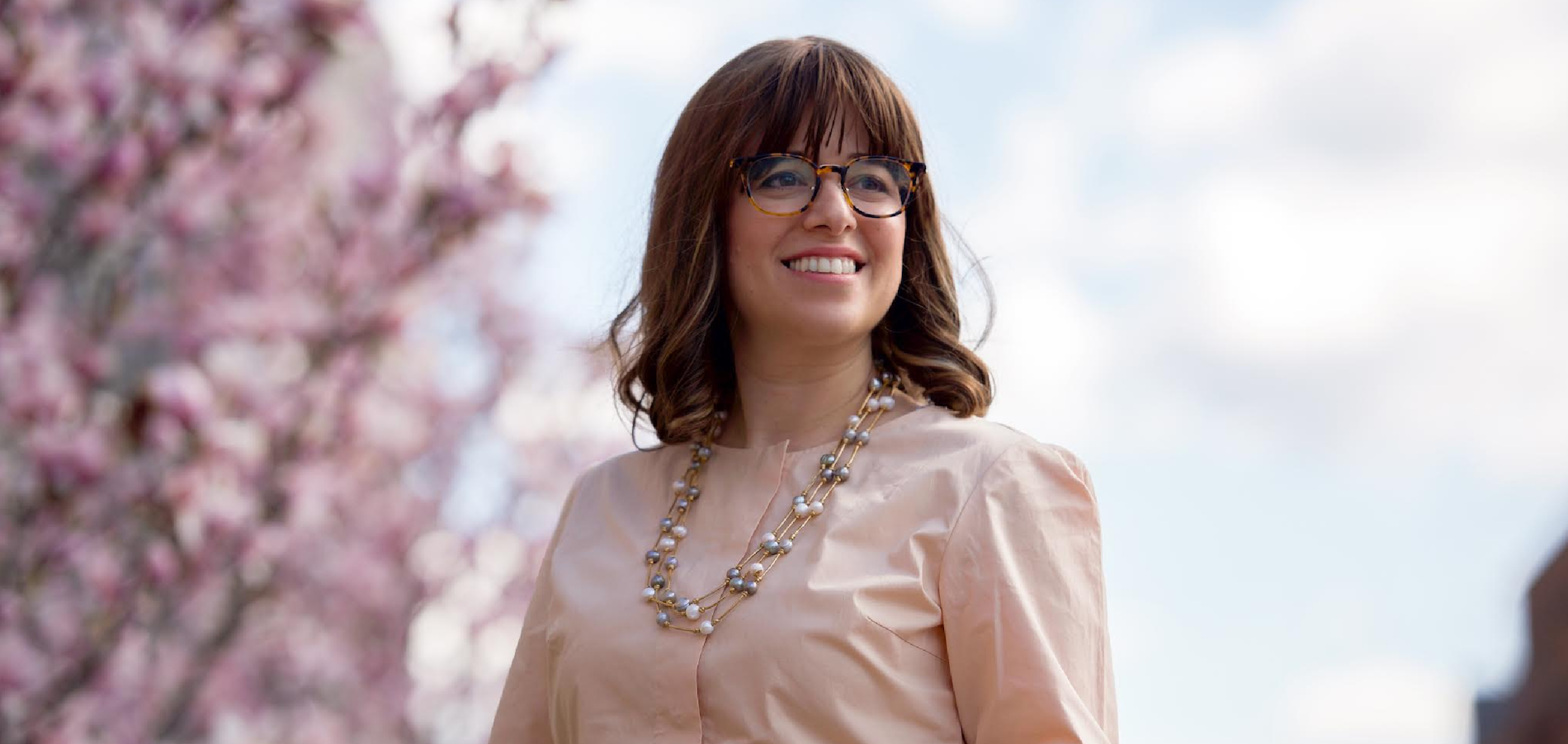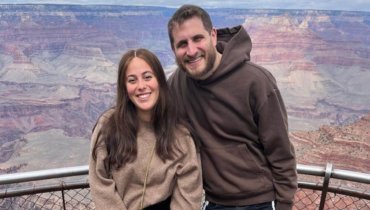
Meet Nechumi Yaffe, The First Woman Raised Hasidic In Israel To Get a PhD
Dr. Nechumi Yaffe grew up in a “rebbish” Hasidic family. She is the first woman raised Hasidic in Israel to receive a PhD, and the first woman from Israel’s Hasidic community to achieve a post-doctoral position. After earning a PhD in political science from Hebrew University, she is now a research fellow with the Princeton Department of Sociology and the University Center for Human Values, where she examines from a social psychology perspective how identity, social norms and authority play a role in creating and preserving poverty. Focusing on the (ultra-Orthodox) Haredi community in Israel, she hopes to expand policy maker’s decisions with her work.
While higher secular education was not the norm where she grew up, Yaffe attributes her family’s thirst for learning as a catalyst for her journey. “I come from a learned background…a sense of responsibility and a deep appreciation for learning….this was the value. This is what life is about.” Born in Haifa, they later moved to Jerusalem, where she attended Bais Yaakov. Her parents, who were third cousins, divorced in a rare move for her community. She attended Gateshead Seminary which is known for its academic excellence because Yaffe was driven to continue her Torah studies on a higher level for as long as she could. It [empowered] me as a person.” She felt that schools spent too much time on knowing the halacha “but the focus on spiritual growth, the relationship with Hashem… was [lacking].” She was inspired to open a school in Israel that was different.
Then she got married and had kids. Previously a mechanechet, she had to step down and teach history part-time. She convinced the school that she had to improve the curriculum, and they agreed. “I went to the library to find material for the new textbook and teacher manual that I was writing. It so happens that the biggest library was in the Hebrew University.” Yaffe went to the library every week, and was exposed to academia. “It took me a whole year to realize [that this was my dream.] I feel like Hashem orchestrated it. Towards the end of the year I realized, this is my next [step].”
She put together her cobbled-together Bachelors’ degree and the curriculum book that she wrote to serve 10,000 students per year, and approached the University. She was accepted to a Master’s program in Conflict Resolution. “I wanted to understand my Haredi community and the [relationship between] them and the secular community in Israel. I wanted to understand the psychology, economics, history, and this program covers it all.”
Yaffe enrolled there soon after. “It didn’t even dawn on me that there [were] no Haredim around me.” It didn’t stop her. “If you are a person that is focused on yourself and your duties in life… saying ‘what is my obligation in this world?’ you have as the Mesilas Yesharim says, ‘I came to this world to fix something, I have a special [mission] that Hashem wants me to do.'” Yaffe sees this as being applicable in the Western/Secular realm too. “‘I want to express myself as a fully individual human being.’ Once the focus is on me versus society, at the end of the day, everyone has socieital barriers. You only end up doing something if you are committed to yourself as a person.”
Yaffe took her inspiration to move forward from the Torah. “From a Jewish perspective, this is what Hashem wants from you. To be authentic, to be an individual. If you look at Tanach, this is what was special about [the Avos]…they are doing things that are not like their society. They were individuals, rising to the occasion. They were committed to [fulfill] their personal life to the greatest extent.”
Not only was the program academically challenging, it also was challenging spiritually. “It is very easy to dismiss the Western world’s ideas if you don’t understand what they’re about. But once you understand it, you have to evaluate [and try to] understand Torah better.” It was also challenging socially. “I was very lonely. I could not understand the people around me… their jokes. They had a lot of fun, and I felt like I missed it.” Yaffe tried to reconcile this. “I was extremely religious, and I was oblig[at]ed to my family, to my community, to having children, to being a mother, to be the bread[winner] as my husband studied Torah.” Her fellow students had different lives. “They were going to bars every night…it took me a while to realize that my life was just as fun as theirs, just a different kind of fun.”
Yaffe decided not to tell many people in her community about her enrollment in university at first. “I got mixed reactions. My siblings and my father really supported me. I was very lucky.” This was more apparent as she started to become more successful as her program progressed. “I think its much easier to get support when you’re successful.”
She constantly heard from her Israeli classmates that they were surprised that Haredim could be like her. “I myself had to break a lot of stereotypes about the secular world, so it worked both ways.” She found an even warmer reception at Princeton. “I felt I could really openly be who I am, talk about Torah and…bring it into my work. When I brought my religious perspective, they were embracing it.”
Her expectations had to shift in order to realize her dream. She was no longer going to be the perfect balabusta, and she came to terms with that. “You have to prioritize.” She knows that it is easy to blame one’s background for a lack of success. “Yes some people have it harder, but those who are willing to work hard, those are the ones who will achieve…God can open a door for you, but it’s not enough. You have to walk [through it.]”
If you found this content meaningful and want to help further our mission through our Keter, Makom, and Tikun branches, please consider becoming a Change Maker today.








3 comments
Sort by
No doubt there’s much positive in her accomplishments. It doesn’t seem to quote her in this article but in a print article in another Jewish newspaper, she’s quoted as saying her father said it’s a shame she wasn’t a boy, she could have been a rabbi. On so many levels this purported quote from her father is horrible on so many levels. He didn’t think there was anything disturbing about saying this to his daughter and she didn’t seem to have a problem with it either. Both are so used to the sexism and misogyny that the horror of the comment isn’t apparent. Given that her dissertation is about power and authority in the Charedi community I find it quite odd she does not see the irony.
Thanks for your comment, Susan. I heard her say this too. She also told me that he was very supportive of her studies and accomplishments. The reality is that in the Hasidic world there is a limit to female leadership and scholarship right now. (Sarah Schnerirer was a bit of an iconoclast in her day.) There is more leeway in less insular Orthodox communities, but in all there is a limit. Nechumi does not have her head in the sand. She lives in a world with tension. She is proudly Hasidic and wants to remain that way but is not blind to the challenges. She’s an incredible inspiration for all people.
Hi, I just wished to point out to Susan that Dr.Yaffe’s father may have been casually kibbitzing to his daughter. According to the article, he had been supportive of her choices! So frankly, I don’t think there’s as much “wall-to-wall” tension or horridness as either of you might think there is (unless viewing it from a detached perspective).
I have chassidic neighbors who attended ultra-chassidic schools, and I’ve seen all the siblings grow up. One of the girls is a casual, carefree type (more so than her older sisters) and full of vitality, as well as a voracious reader who would borrow English-language novels from me to read. Her perspective, is that she feels sorry for the Litvish who are tied up in knots with shidduch resumes and shidduch crises.
While indeed the shidduch crisis is major, yet I know plenty of carefree casual Litvishe people too. IMO, the real tension happens when people from a particular culture/milieu foray out into a world very different than their own, and then need to reconcile the various worlds they’ve experienced and make sense of it all. Such people must develop sorta a split personality. It’s =that= which causes true tension, and which people of past generations didn’t have to contend with as much as is happening nowadays.
The more one forays into different cultures and languages, the more it becomes like entering yet another and another and another incarnation, and thus the more isolating and complex it gets. And while it’s true it can be mind-expanding, yet it can impact on one’s emotional and physical health, depending upon circumstances.